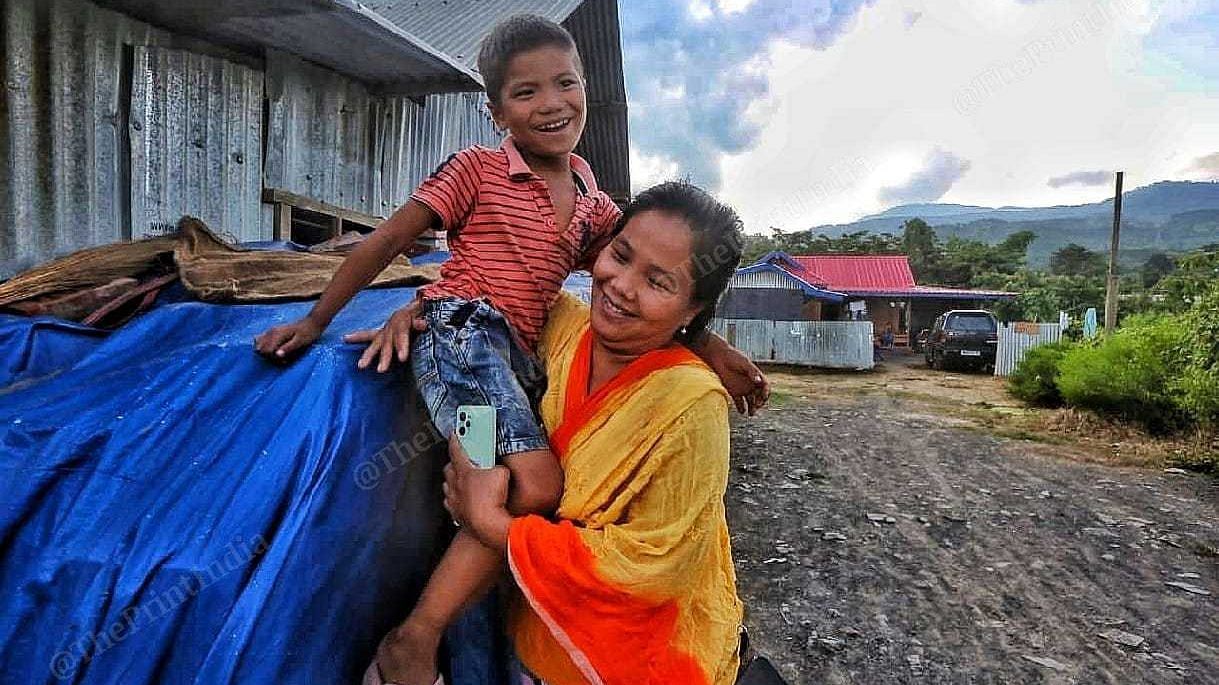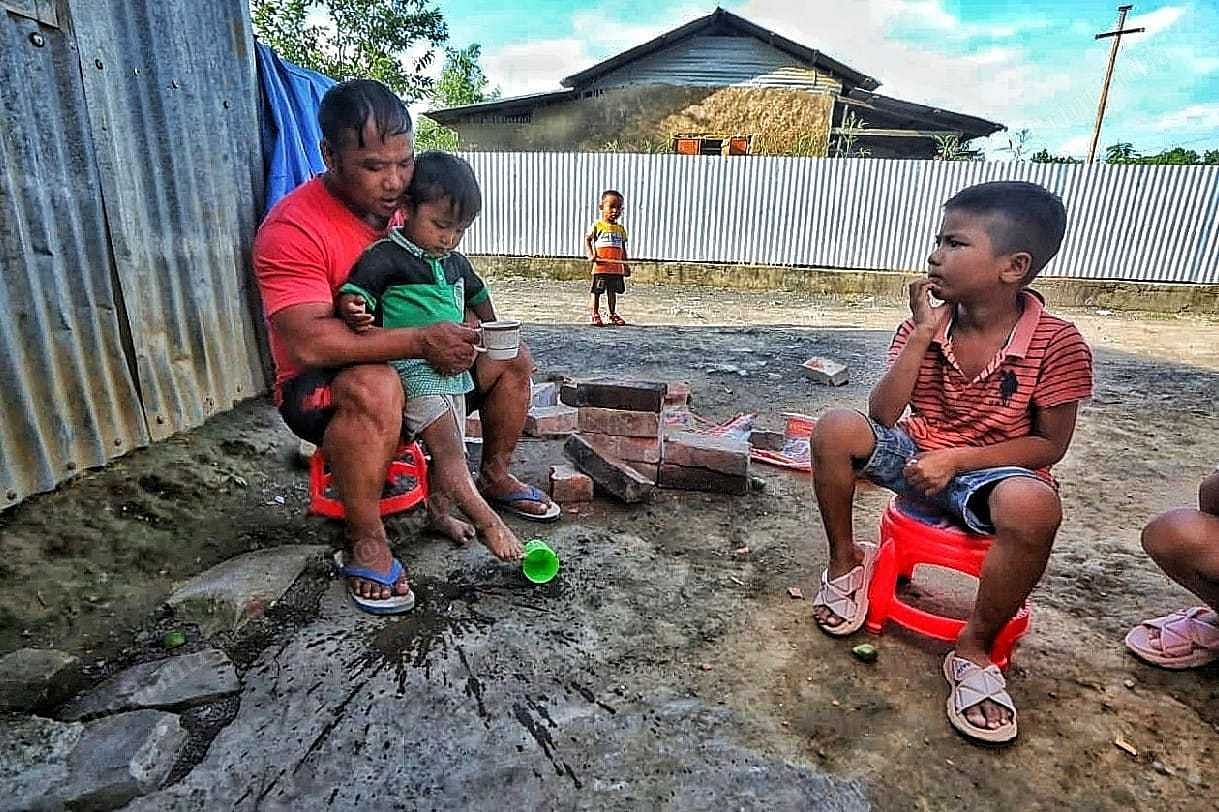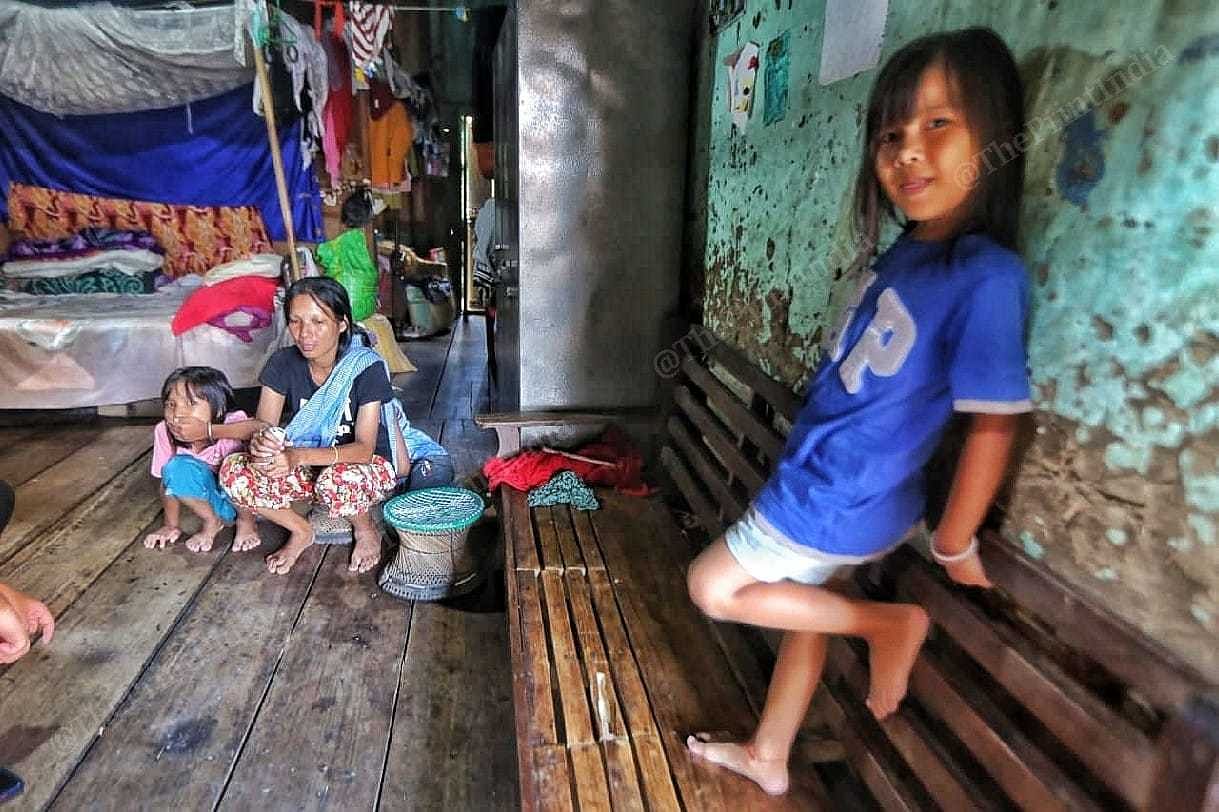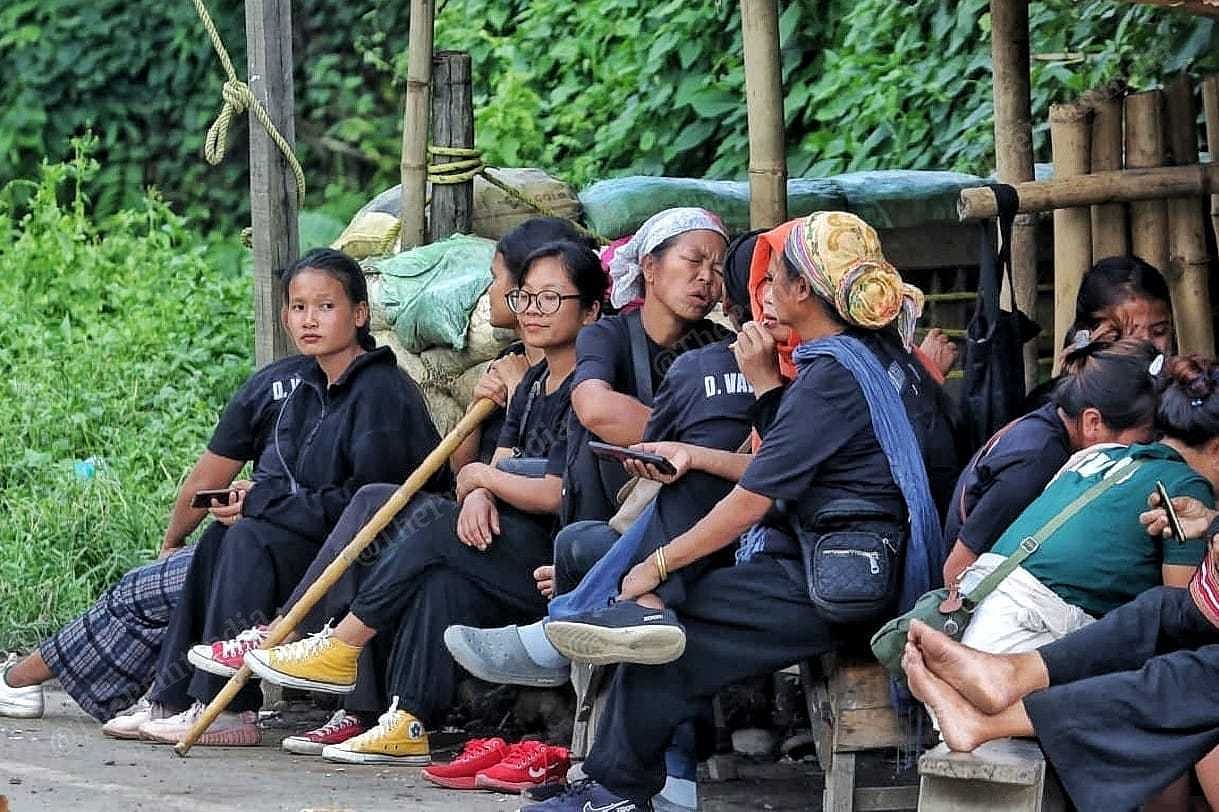
Manipur violence has a silent victim—broken marriages of Kuki-Meitei couples
Don't Miss
Many Kuki-Meitei relationships are splitting under the heat of street hate. Psychologists say its impact is likely to be felt for a long time.
 |
| Six-year-old Monsang with his mother Kim Haokip in Churachandpur, Manipur | Photo: Praveen Jain/ThePrint |
The first thing her Meitei husband did was abandon his Kuki wife and their children and flee. He escaped from the raging fires to Mizoram to seek refuge, leaving her to fend for herself in the Meitei dominated village. He feared that he would be targeted by the Meitei mob for marrying a Kuki woman.
A frightened Haokip stayed locked inside her home for three months. The ethnic clashes raged all around for weeks.
“I never imagined this kind of hate would end my marriage,” Haokip, 35, said. “I don’t know if I will ever meet my husband again. Maybe if things calm down, he will get in touch with me, but there’s no certainty. My children have stopped going to school, and the money I make isn’t enough.”
The terror faced by mixed marriage couples and the abandonment are among the least talked about horrors that tore the fragile fabric of Manipur society. Inter-tribe marriages between Kukis and Meiteis were common and haven’t ever been a cause of social trouble, with the two communities easily mingling with each other till the ethnic clashes erupted in May. The street violence and hate have taken a deep toll on relationships that defied these ethnic divisions in the first place. In all the news about arson, deaths and rape in Manipur, the quiet fracturing of marriages has been the invisible tragedy that is not being widely acknowledged or even counted. Many of these mixed tribe relationships are splitting under the heat of street hate. And psychologists say its impact is likely to be felt for a long time as the divide remains palpable on ground.
All these years, we never really cared whether our friends were Kuki or Meitei. It never crossed our minds. But now, the situation is such that I must think twice before talking to a Meitei because I might get targeted
—Hemam Dimpu, a 19-year-old college student in Imphal
Abandonment, personal safety
For long, her Meitei neighbours did not know about her Kuki identity. But they started getting suspicious when her husband ran away. Haokip hid from everyone and then could no longer bear it when the food ran out. “I had to look after myself to keep my children alive,” she said. That’s when she recalled that a relative worked for the Indian Army and is posted in New Delhi. Haokip reached out to him for help when the situation went out of control. He alerted the Assam Rifles about Kim’s condition.
At around 3.45 pm on an August day, three Assam Rifles officers, in plainclothes, reached Haokip’s home. They rescued Haokip and her young sons in a covert operation. She was kept in a Muslim-dominated area for her safety. The following morning, she was taken to a nearby camp before being flown out of Imphal in a helicopter.
 |
| Six-year-old Monsang (right) spends time with his maternal family in Churachandpur, Manipur | Photo: Praveen Jain/ThePrint |
Haokip’s six-year-old son now wants to become a doctor. But he doesn’t miss his father, who abandoned them on the doorstep of danger.
“There were many Kuki-Meitei couples in my neighbourhood in Imphal. I don’t know what happened to them. I will never know if they are alive or dead,” Haokip said, the despair in her eyes darkening. “Mine won’t be a happy ending, I feel.”
Couples from different tribes are struggling to live together, and the support for each other has dwindled under the changed circumstances. “Peace will play a big role and the government needs to reassure the inter-tribe couples that they are safe in Manipur,” Dr Linthoisana, a clinical psychologist in Imphal, told ThePrint.
I never imagined this kind of hate would end my marriage. I don’t know if I will ever meet my husband again—Kim Haokip, 35, a Kuki married to a Meitei
The young won’t dare now
The violence has split neighbourhoods, turning Manipur into partitioned blocs. But what has gone almost unnoticed are the changing perceptions and intangible anxieties among the young.
In the chaotic rhythm of the Ima Keithel market in the heart of Imphal, some whispered conversations among the youth betray the unease. As they shopped for vegetables at dusk, they tiptoed around new unwritten codes of social engagement that have surfaced after the violence.
Hemam Dimpu, a 19-year-old college student in Imphal, spoke of growing up learning that love triumphs hate, but that notion does not hold true for his home state anymore. “All these years, we never really cared whether our friends were Kuki or Meitei. It never crossed our minds. But now, the situation is such that I must think twice before talking to a Meitei because I might get targeted,” he said.
The stories of fractured marriages in Manipur have become a reality, and the young are hearing about them as well.
Monika Kaya, an 18-year-old student at a city college, said it now feels like a forbidden act to even glance at a Kuki. “We saw what happened to two Meitei students who were killed. Perhaps they were in a relationship, but the Kukis were consumed by anger. I can never imagine being with a Kuki, let alone marrying one,” she told ThePrint.
Others’ hate took their love
In Churachandpur, Lalnunmawii, 48, sat by her sewing machine next to a window, reminiscing about how she met her husband at the village bus stop when she was just 18. “Dilip was a bus driver. He used to make a trip to the village every day around noon. I would wait for him at the stop, never missing the bus for three years until we married,” she said with a smile.
Dilip, a Meitei, has gone back to his native village near Imphal, about 98 km away, to protect his mixed-marriage. He must now stay away from her. “He calls occasionally, but we cannot see each other. He is almost 60 now, growing older and weaker. He left us in May, and I fear I may never see him again. Perhaps we will reunite in heaven,” said Lalnunmawii, her voice trembling. She has four children, two girls and two boys, aged between 18-28. Their lives have come to a standstill. “I have taken up odd jobs to support my children’s education, but I have lost everything.”
Then there are mixed marriages where one was killed by the mob.
Rebecca, 38, a Kuki, had to abandon her home in Churachandpur and seek refuge in Assam after the violence in May shattered her family. Her husband, a Meitei, was killed in the clashes. “I no longer felt safe in the place I was born. I have lost my home, my family, and everything that defined my identity. This wound in my heart will never heal. Here, all I have left are memories as I try to rebuild my life,” she told ThePrint over the phone from Guwahati.
But community leaders are mostly in denial about the extent of the problem. They speak more readily about death and destruction during the riots than the break-up of marriages. It isn’t being documented either.
When ThePrint reached out to Ginza Vualzong, the spokesperson for the Indigenous Tribal Leaders’ Forum, he admitted to hearing about such instances but had no data to share. “In Churachandpur, we have ensured everyone is safe. There is no discrimination. However, that’s not the case in Imphal.”
Meitei leader K Athouba, spokesperson for the Coordinating Committee on Manipur Integrity (COCOMI), said that this isn’t a worrisome trend yet. “While some couples had to separate, many continue to live in harmony. I don’t think it’s a statewide trend we need to be concerned about yet,” he said.
 |
| 31-year-old Ana, a Meitei, spends time with her children at home in Churachandpur, Manipur | Photo: Praveen Jain/ThePrint |
But for some, the loss is irreparable. In a narrow alley of Churachandpur’s old bazaar, 31-year-old Ana, a Meitei, sits in a dimly lit room, her eyes weary, her hands clutching a Bible as she searches for answers that remain elusive. Her six-year daughter sits beside her, holding a toy phone, pretending to speak to her father. “Mother, when will father come home? I will take him to the shop to buy chocolate,” the child says excitedly. As tears roll down her cheeks, Ana covers her face with her hands. She hasn’t found the words to tell her daughter that she will never see her father again.
Ana’s husband, Lunginlal, was dragged out of their rented home in Imphal and killed in the ethnic clashes that ripped through Manipur in May. The 35-year-old’s crime was that he was born a Kuki. “He was working at a construction site in Imphal. I received a call from him at 5 am on May 4. Half-sleep, I mumbled a few words. I didn’t listen to what he said. When I called back, he said that the situation in Imphal was getting out of control and he planned to return home. But he never did. They (Meiteis) dragged him out of the home and killed him,” she said.
Ana was only 14 when she met Lunginlal for the first time at a relative’s place. Their eyes met and it was “love at first sight”. Lunginlal proposed to Ana five years later, and they lived happily with their children in a one-room house in Churachandpur district. However, three decades later, communal hate has forever torn them apart. Now, Ana is unsure how to break the news to her children. “My eldest daughter has realised there is something I am hiding, while the younger one never stops asking about her father.”
(Edited by Prashant)



0 Response to " Manipur violence has a silent victim—broken marriages of Kuki-Meitei couples"
Post a Comment
Disclaimer Note:
The views expressed in the articles published here are solely those of the author and do not necessarily reflect the official policy, position, or perspective of Kalimpong News or KalimNews. Kalimpong News and KalimNews disclaim all liability for the published or posted articles, news, and information and assume no responsibility for the accuracy or validity of the content.
Kalimpong News is a non-profit online news platform managed by KalimNews and operated under the Kalimpong Press Club.
Comment Policy:
We encourage respectful and constructive discussions. Please ensure decency while commenting and register with your email ID to participate.
Note: only a member of this blog may post a comment.